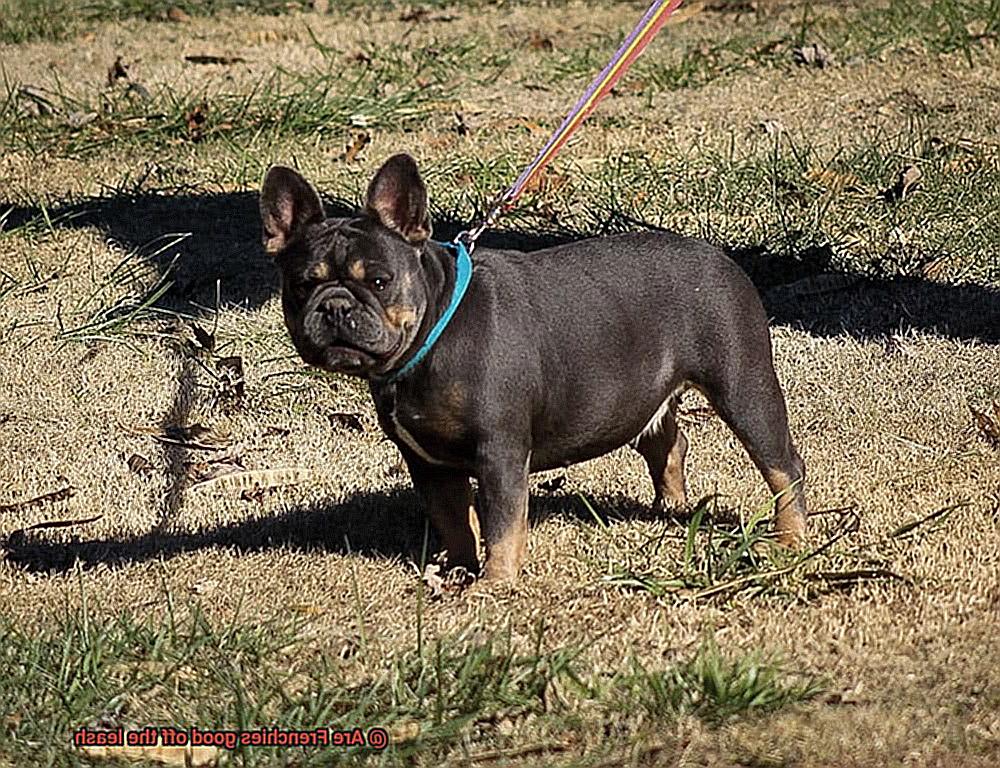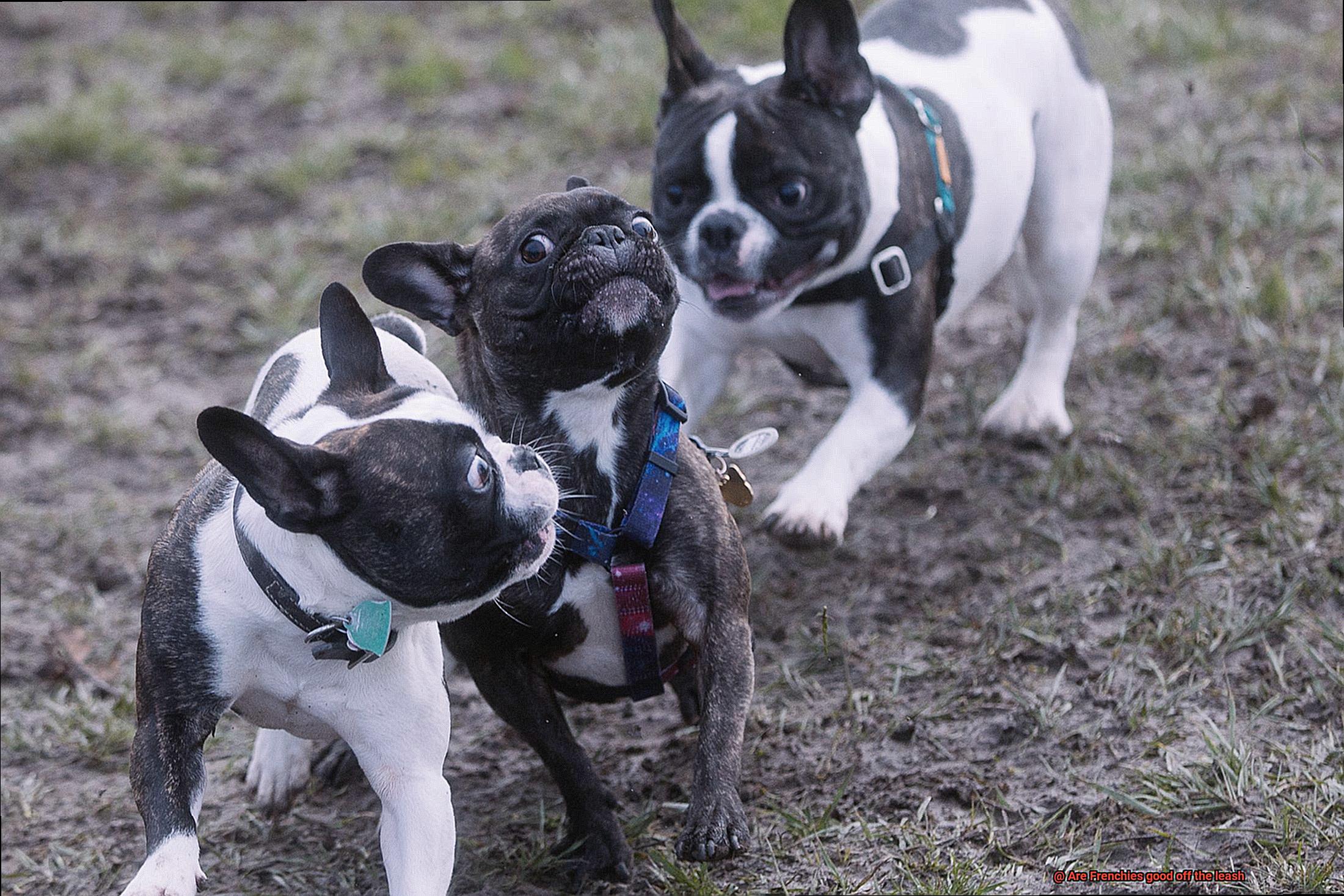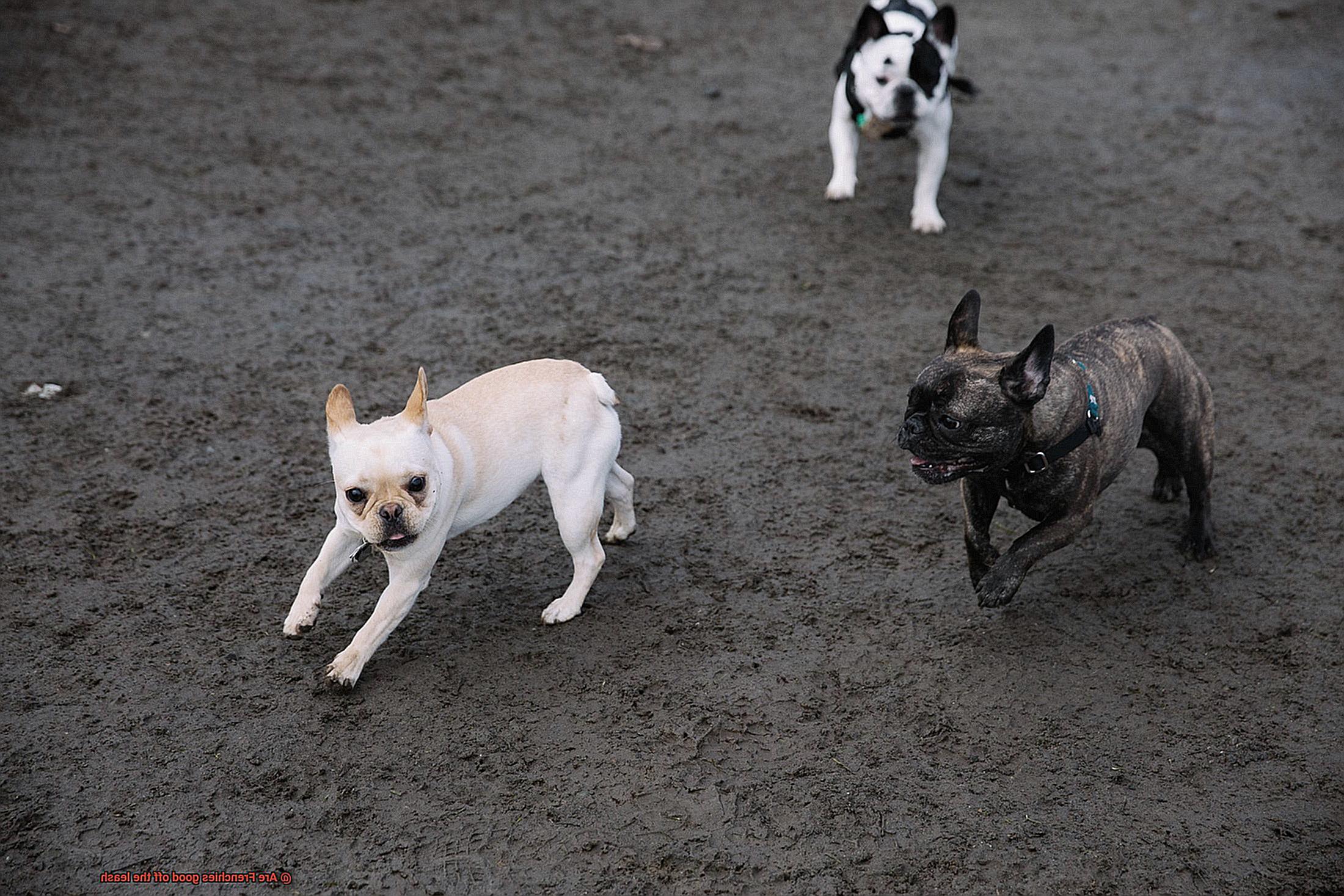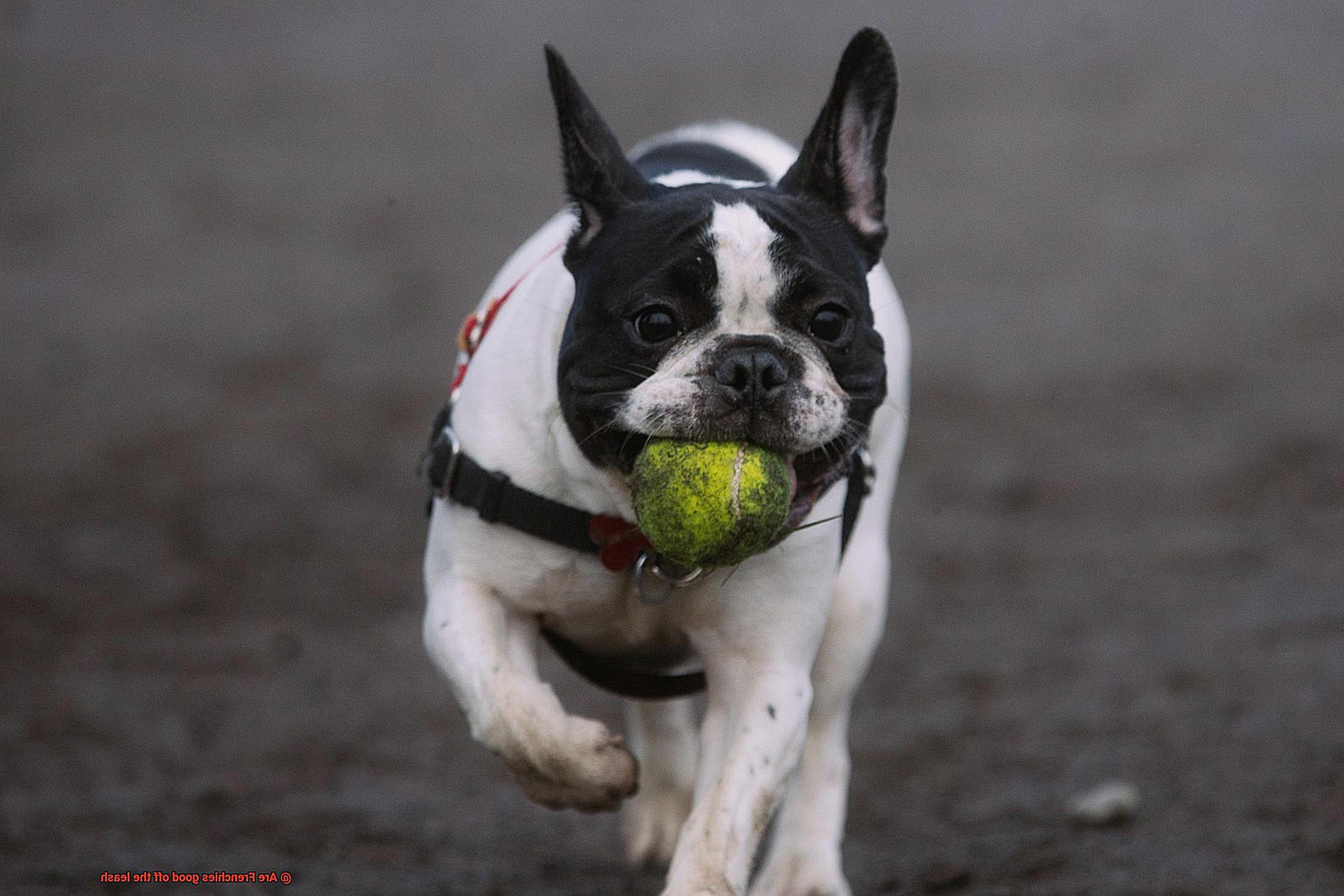Are Frenchies good off the leash?
Today, we’re tackling a burning question that’s got tails wagging and opinions flying: “Are Frenchies good off the leash?” We get it.
Who wouldn’t want to watch those adorable bat-eared pups bounce around freely in the great outdoors? But before you unclip that leash, let’s take a closer look at their unique personalities and tendencies.
So grab your leash (just in case), and let’s embark on this wild adventure together.
Are Frenchies good off the leash
Contents
- 1 Are Frenchies good off the leash
- 2 Understanding the Prey Drive of Frenchies
- 3 The Independent and Stubborn Nature of Frenchies
- 4 Assessing Your Frenchie’s Training and Recall Abilities
- 5 Utilizing Positive Reinforcement Techniques for Off-Leash Activities
- 6 Providing a Safe and Controlled Environment for Your Frenchie
- 7 Supervising Your Frenchie When Off the Leash
- 8 Using a Long Line or Retractable Leash for Control
- 9 Making an Informed Decision About Letting Your Frenchie Off-Leash
- 10 Conclusion
Well, it depends. In this article, we’ll explore the factors that influence a Frenchie’s off-leash behavior and help you determine if your furry friend is ready for off-leash adventures.
Instinctual Drive:
French Bulldogs have an inherent curiosity that can lead them astray when off the leash. Their small size and inquisitive nature make them susceptible to getting distracted by interesting scents or sights. So, always be cautious and keep a watchful eye on your Frenchie in unenclosed areas.
Temperament and Training:
Frenchies are typically friendly and sociable. They enjoy interacting with people and other dogs, which can work in their favor when off the leash. However, individual personalities can vary. Some Frenchies may exhibit independence or stubbornness, affecting their recall and obedience off the leash.
Training:
Training plays a vital role in determining whether a Frenchie will excel off the leash. Starting early with basic obedience training and gradually progressing to advanced commands like recall is essential for establishing trust and control. Consistency, positive reinforcement, and patience are key when training a Frenchie to be reliable off-leash companions.
Environment:
Choosing the right environment for off-leash adventures is crucial. Opt for open spaces with minimal distractions and potential dangers such as busy roads or bodies of water. Dog parks or enclosed areas designed for off-leash play can also provide controlled environments for socialization and exercise.
Understanding the Prey Drive of Frenchies
French Bulldogs are adorable, playful, and full of energy. But did you know that they also have a natural instinct to chase small animals? This prey drive is a result of their ancestry as bull-baiting dogs, where they would chase and catch bulls. While Frenchies may not have the same high prey drive as some other breeds, it is still important for owners to understand and manage this instinct to ensure the safety of both their Frenchie and other animals they may encounter.
Training and Socialization: The Key to Success
Proper training and socialization play a crucial role in managing a Frenchie’s prey drive. Starting training from a young age is highly recommended, as it helps establish good behavior and control over their impulses. Basic obedience commands such as “sit,” “stay,” and “come” are essential in teaching Frenchies to respond to their owner’s commands even when tempted by prey.
Redirecting Energy: Exercise and Interactive Toys
French Bulldogs are known for their bursts of energy. Providing them with both mental and physical stimulation is key to redirecting their energy away from chasing prey. Regular exercise, such as walks or playtime in a fenced yard, can help tire them out and reduce their urge to chase. Interactive toys that require problem-solving skills can also keep their minds engaged and prevent them from becoming fixated on potential prey.

Positive Reinforcement: The Power of Rewards
Using positive reinforcement techniques can be highly effective in teaching Frenchies to focus on their owners rather than succumbing to their prey drive. Rewarding good behavior with treats, praise, or playtime can help reinforce desired actions. It is important to remember that punishment or harsh methods can have negative effects on a Frenchie’s training and may lead to fear or aggression.
Vigilance and Safety Measures
When off-leash with your Frenchie, it is crucial to be aware of your surroundings. Keep an eye out for potential triggers, such as small animals, fast-moving objects, or anything that might pique their prey drive. Being vigilant allows you to intervene and redirect their attention before they start chasing. Using a long leash or harness can also provide some control while still allowing your Frenchie some freedom to explore within safe boundaries.
The Prey Drive of French Bulldogs: Varying Levels
It’s important to note that not all French Bulldogs will have the same level of prey drive. Some may have a stronger instinct than others. Understanding your Frenchie’s individual temperament and adjusting your training and management techniques accordingly can help ensure success in managing their prey drive.

The Independent and Stubborn Nature of Frenchies
Understanding and managing their unique personality traits can lead to a well-behaved and obedient Frenchie. In this article, we will explore effective strategies and techniques to train your Frenchie to be reliable off the leash.

Understanding the Independent and Stubborn Nature:
French Bulldogs are known for their strong-willed and self-assured personalities. This independence can make them less inclined to obey commands off the leash. It’s important for owners to recognize this trait and adapt their training methods accordingly.
Consistency is Key:
Consistency is crucial in training a Frenchie to be obedient off the leash. Establish clear boundaries and rules from an early age, reinforcing them consistently. Use positive reinforcement techniques such as treats, praise, and rewards to motivate and encourage your Frenchie during training sessions.
Leash Training from an Early Age:
Start leash training as early as possible to instill good habits in your Frenchie. Teach them to follow commands even when distractions are present. Begin with short walks in quiet areas and gradually increase the difficulty level. This will help establish a strong foundation for off-leash training.
Utilize Positive Reinforcement:
French Bulldogs respond well to positive reinforcement techniques. Reward your Frenchie with treats or praise when they successfully follow commands off the leash. This positive association will motivate them to repeat the desired behavior.
Patience is Key:
Frenchies may require more time and effort in training due to their stubbornness. Be patient and persistent during the training process. Stay calm and avoid getting frustrated as this may hinder progress.
Seek Professional Help if Needed:
If you find that your Frenchie’s stubbornness is causing significant challenges in off-leash training, consider seeking guidance from a professional dog trainer. They can provide expert advice tailored to your Frenchie’s specific needs.
Assessing Your Frenchie’s Training and Recall Abilities
While some Frenchies may seem like they have a one-track mind when it comes to following commands, with the right approach and consistent training, many can surprise you with their off-leash abilities. In this blog post, we’ll explore how to assess your Frenchie’s training and recall abilities for off-leash activities. So grab a treat (or two.) and let’s get started.
Building a Solid Foundation:
Before we dive into off-leash training, it’s crucial to establish a strong foundation of basic obedience commands such as “sit,” “stay,” “come,” and “leave it.” These commands lay the groundwork for off-leash success and ensure your Frenchie’s safety.
Controlled Environments:
Start by practicing these commands in a controlled environment with minimal distractions. A quiet room or a fenced backyard works wonders. Gradually increase the difficulty by introducing distractions like toys or treats. Observe how well your Frenchie responds in different scenarios – this will give you valuable insights into their training progress.
Motivation Matters:
Just like us humans, French Bulldogs have different preferences when it comes to rewards. Some are foodies at heart and will do anything for a tasty treat, while others may prefer praise, playtime, or even a favorite toy. Discover what motivates your Frenchie and use it as a powerful tool for positive reinforcement during training sessions.
Consistency is Key:
Consistency is the secret sauce when assessing your Frenchie’s training and recall abilities. Set aside dedicated training sessions each day and make sure everyone in the family is on the same page regarding commands and expectations. Remember to consistently reinforce positive behaviors and avoid unintentionally rewarding undesirable ones.
Mastering Recall:
Recall is a vital skill for off-leash activities. Start by practicing in a secure environment, such as indoors or in a securely fenced area. Use a long line or retractable leash initially to maintain control while giving your Frenchie more freedom to explore. Gradually increase the distance between you and your furry friend, but always prioritize safety. If your Frenchie becomes distracted or disinterested, take a step back to a less challenging environment and reinforce the recall command.
Embrace Individuality:
Every Frenchie is unique, just like fingerprints. Some will excel in off-leash training and have impeccable recall, while others may struggle with distractions or possess a more independent nature. Embrace their individuality and adjust your training approach accordingly. Remember, patience and understanding go a long way in nurturing your Frenchie’s potential.
Utilizing Positive Reinforcement Techniques for Off-Leash Activities
French Bulldogs, with their playful and adventurous nature, can excel in off-leash activities. However, proper training is crucial to ensure their safety and obedience. In this article, we will explore effective positive reinforcement techniques to train your Frenchie for off-leash adventures.
Establishing a Foundation:
Before diving into off-leash training, it’s essential to establish a strong foundation of basic obedience commands. Teach your Frenchie commands like sit, stay, and come using positive reinforcement methods such as treats or rewards that they find highly motivating.
Start in a Controlled Environment:
Begin training in a controlled environment with minimal distractions. This could be your backyard or a quiet park. Gradually increase the level of distractions as your Frenchie becomes more proficient in following commands off-leash.
Reward and Praise:
When your Frenchie successfully responds to a command off-leash, immediately reward them with praise and a treat. This positive reinforcement will reinforce the desired behavior and encourage them to continue obeying off-leash.
Consistency is Key:
Consistency is vital when training your Frenchie off-leash. Set aside regular training sessions and practice off-leash commands in various locations to ensure they become reliable in different environments.
Addressing Challenges:
If your Frenchie struggles with certain commands off-leash, go back to practicing those commands on a leash until they are proficient before attempting off-leash training again. Each Frenchie has its own learning pace, so be patient and adjust your training approach accordingly.
Safety First:
During off-leash activities, prioritize safety. Be aware of your surroundings and potential hazards that could pose a risk to your Frenchie. Keep them away from busy roads or areas where they could encounter aggressive dogs.
Seek Professional Help:
If you encounter difficulties or feel unsure about how to effectively train your Frenchie off-leash, don’t hesitate to seek professional help. A reputable dog trainer can provide guidance and support to ensure a safe and enjoyable off-leash experience.
Providing a Safe and Controlled Environment for Your Frenchie
French Bulldogs are known for their lively and spirited personalities. Whether it’s a game of fetch in the park or a hike through the woods, letting your Frenchie off the leash can be an exhilarating experience for both of you. However, ensuring their safety and obedience is crucial. In this article, we will explore effective techniques to provide a safe and controlled environment for your Frenchie when off the leash.
Training is Key:
Start by training your Frenchie basic commands like “sit,” “stay,” and “come.” Consistency is key in reinforcing these commands. Practice in a secure and enclosed space to minimize distractions and potential hazards.
Gradual Progression:
Once your Frenchie has mastered the basics, gradually introduce distractions to test their obedience. Use toys or treats to reward them for correct responses. This will help reinforce positive behavior and build their off-leash reliability.
Recall Exercises:
Regularly practice recall exercises by calling your Frenchie back to you and rewarding them promptly. This exercise strengthens their bond with you and ensures they come when called, even in challenging situations.
Leash as a Safety Net:
When venturing outside controlled environments, use a long or retractable leash initially. This allows you to maintain control while giving your Frenchie some freedom to explore within a safe distance. As their reliability improves, decrease reliance on the leash gradually.
Respect Local Regulations:
Be aware of local leash laws and regulations when taking your Frenchie to public places. Some areas may require dogs to be leashed at all times, while others may have designated off-leash areas. Respecting these rules ensures the safety of your Frenchie and others around you.
Mental Stimulation:
Along with physical exercise, provide mental stimulation for your Frenchie. Engage them in activities like puzzle toys, scent games, or obedience training sessions. This keeps their minds sharp and prevents boredom.
Prioritize Safety:
Always prioritize the safety of your Frenchie. If you’re unsure about their behavior off the leash or if they tend to wander off or display aggression towards others, it’s best to keep them on a leash for everyone’s safety.
Supervising Your Frenchie When Off the Leash
If you’ve ever unleashed your Frenchie for a romp in the great outdoors, you know just how exhilarating it can be. But before you let them loose, it’s crucial to have the right supervision techniques in place to ensure their safety and the safety of others. So, grab your leash and let’s dive into some expert tips on how to supervise your Frenchie when they’re off the leash.
- Choose a secure environment: When it comes to off-leash activities, opt for enclosed spaces like fenced-in yards or designated dog parks. These areas provide a safe haven for your Frenchie to explore and play without the risk of them running off or encountering potential dangers.
- Be attentive to their behavior: Your Frenchie may have a mind of their own, but it’s important to keep a close eye on their body language. Look out for signs of discomfort or anxiety, and if they start getting overly excited or fixated on something, redirect their attention or intervene if necessary. This can prevent conflicts with other dogs or people nearby.
- Train a solid recall command: Teaching your Frenchie to come when called is a game-changer for their off-leash adventures. Start in controlled environments with minimal distractions and gradually increase the difficulty level. Positive reinforcement, such as treats and praise, will motivate them to respond to your recall command.
- Use visual cues: In areas with limited visibility, like tall grass or dense foliage, it can be helpful to use visual cues to keep track of your Frenchie. Consider attaching brightly colored flags or clothing items to them so that they stand out from their surroundings, making it easier for you to spot them from a distance.
- Carry a leash as a safety net: While it may sound counterintuitive, always have a leash on hand when supervising your Frenchie off the leash. You never know when an emergency or unexpected situation might arise, and having a leash readily available allows you to quickly regain control and prevent accidents or conflicts.

Using a Long Line or Retractable Leash for Control

Unleashing your French Bulldog for some off-leash adventures can be thrilling, but it’s important to have the right tools and techniques to keep them safe and under control. In this article, we’ll explore the use of long lines and retractable leashes as effective tools for controlling your Frenchie while giving them the freedom to explore.
Safety Precautions:
Choose the Right Environment:
- Opt for enclosed parks or securely fenced yards to ensure your Frenchie’s safety.
- Avoid busy streets, crowded areas, or places with potential hazards.
Proper Leash Handling:

- Hold the leash with a firm grip to maintain control.
- Be prepared to respond quickly if your Frenchie pulls or lunges towards something.

Gradual Introduction:
- Start in a familiar and secure area to allow your Frenchie to adjust to the added length.
- Slowly increase the distance and complexity of the environment as they become comfortable.
Monitoring Behavior:
- Stay attentive to your Frenchie’s behavior and body language.
- Watch for signs of distraction, aggression, or discomfort.
Assess Individual Suitability:
- Consider your Frenchie’s temperament, training, and recall ability.
- Not all Frenchies may be suitable for off-leash activities, even with a long line or retractable leash.
Benefits of Long Lines and Retractable Leashes:
Increased Freedom:
- Long lines and retractable leashes provide your Frenchie with more room to explore.
- They can enjoy increased exercise and mental stimulation.
Maintained Control:
- You still have the ability to quickly reel in your Frenchie if needed.
- The lock feature on retractable leashes allows you to control their roaming distance.
Making an Informed Decision About Letting Your Frenchie Off-Leash
Picture this: you’re strolling through a beautiful park, the sun shining down on you and your French Bulldog. As you watch your furry friend sniffing the grass and enjoying the freedom to explore, you can’t help but feel a sense of joy and pride. But before you let your Frenchie off-leash, it’s important to make an informed decision based on their personality, training, recall ability, and the environment. Let’s dive into these factors to ensure the safest and most enjoyable off-leash experience for both you and your Frenchie.
Personality and Behavior
French Bulldogs are known for their friendly and sociable nature. They love being around people and other dogs, making them great companions for off-leash adventures. However, it’s important to remember that every Frenchie is unique. Some may be more independent or have a higher prey drive than others. Assess your Frenchie’s specific personality traits to determine if they are suitable for off-leash activities.
Training and Socialization
Proper training and socialization are essential for any dog, especially when considering off-leash activities. Basic obedience training, such as sit, stay, and recall commands, is crucial in ensuring your Frenchie’s safety and responsiveness. Additionally, early socialization with other dogs, people, and various environments can contribute to a well-rounded and confident Frenchie.
Recall Ability
A reliable recall is vital when deciding whether to let your Frenchie off-leash. Assess your Frenchie’s recall skills by practicing in controlled environments with minimal distractions. Gradually increase the level of distractions to see how well your Frenchie responds. Consistency and positive reinforcement play a key role in reinforcing good recall behavior.
Environment Evaluation
Before unleashing your Frenchie, evaluate the environment in which you plan to let them roam freely. Securely fenced areas, dog parks, or open spaces with minimal risks are ideal choices. Be aware of potential hazards like busy roads, bodies of water, or areas with wildlife that may trigger your Frenchie’s instincts.
Alternative Options
If off-leash activities are not suitable for your Frenchie, there are alternative ways to provide exercise and mental stimulation. On-leash walks, interactive play sessions, puzzle toys, or structured training exercises can keep your Frenchie physically and mentally engaged.
Seek Professional Guidance
If you’re unsure about your Frenchie’s suitability for off-leash activities, it’s always beneficial to seek professional guidance. Dog trainers or behaviorists who specialize in off-leash training can assess your Frenchie’s abilities and provide personalized training plans tailored to their needs.
5EJ4w6AhurM” >
Conclusion
In conclusion, French Bulldogs can be unpredictable when it comes to off-leash behavior. While some may excel at recall and stay close to their owners, others may have a strong independent streak and wander off without hesitation. It is important for Frenchie owners to assess their individual dog’s temperament, training, and level of socialization before deciding whether or not they can be trusted off the leash.
It’s crucial to remember that Frenchies are a brachycephalic breed with compromised respiratory systems, which can affect their endurance and ability to keep up during off-leash activities. Additionally, their strong prey drive and stubborn nature can make them easily distracted by squirrels, birds, or other enticing stimuli.
To ensure the safety of your Frenchie and those around you, it is recommended to utilize a secure fenced area or invest in a long-line leash for supervised freedom. This allows them to explore and enjoy some off-leash time while still maintaining control and preventing potential hazards.
Ultimately, each Frenchie is unique, and while some may prove themselves trustworthy off the leash with proper training and consistency, others may require more supervision and restraint. It’s essential for owners to prioritize their dog’s safety above all else and make informed decisions based on their individual characteristics.
So, if you’re considering letting your Frenchie roam free without a leash, take into account their personality traits, training history, physical limitations, and the surrounding environment.




